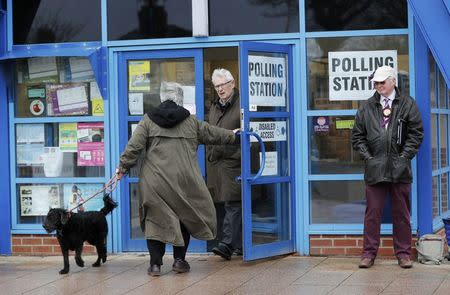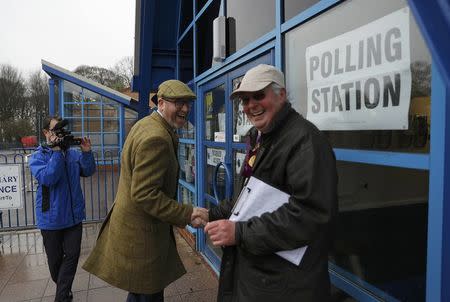Vital test for Labour as polls open in party heartlands
By William James LONDON (Reuters) - Britons began voting on Thursday in two areas long seen as strongholds of the Labour Party for parliamentary elections expected to test whether leftist leader Jeremy Corbyn still commands the support of his working class power base. Bookmakers are predicting close contests in the former industrial city of Stoke-on-Trent in central England, where Labour could be ousted by the pro-Brexit UK Independence Party, and the northwestern region of Copeland where Prime Minister Theresa May's Conservatives could score a landmark gain. The elections are expected to show how last year's vote to leave the European Union has redrawn the British political map, pitching disillusioned blue-collar workers in poorer regions of the country against a largely pro-EU metropolitan establishment. The Labour Party has so far been the biggest victim of the appetite for political change, left straddling the Brexit fault line as both the traditional voice of the working class and the party of choice for many liberal inner-city voters. The results of Thursday's elections, due some time after 0300 GMT on Friday, will reveal the extent of the damage. Although Corbyn's position is not expected to come under renewed assault, loss in either could induce fresh turmoil in Britain's second largest party, further draining Corbyn's authority and weakening Labour's fight in parliament to temper May's plans for a "hard Brexit", or clean break with the EU. UKIP THREAT In Stoke Central, a Labour-held seat since its creation in 1950, the party's biggest threat is UKIP - the populist anti-establishment movement that persuaded many Britons to vote 'Leave'. Last June almost 70 percent of people in Stoke voted for Brexit. UKIP is fielding its leader Paul Nuttall and has high hopes of a victory that would give the party its second seat in parliament and a prominent platform on which to build its presence. But UKIP has been bogged down by vicious in-fighting since charismatic former leader Nigel Farage stepped down last year, and its campaign in Stoke has stuttered due to a series of gaffes by Nuttall. Failure to win in an area with such strong support for its core objective would call in to question whether UKIP is capable of making good on its often-stated promise to usurp Labour and become Britain's official opposition. "I don't think anybody for one moment can underplay just how important, just how fundamental that by-election is for the futures of both the Labour Party and indeed of UKIP too," Farage told UKIP's Spring conference last week. Further north in Copeland, a rugged coastal region whose fortunes are hitched to the local nuclear power industry, May's Conservatives could reclaim a seat they haven't held in over 80 years. Although Labour's grip on the area has weakened with the decades-long decline of the local mining, steel and fishing industries, Thursday's vote could prove a tipping point. If it does, and the Conservatives claim the first by-election gain by a ruling party since 1982, many within the party will look directly to Corbyn for an explanation. Earlier this month, voters interviewed by Reuters cited his leadership, and specifically his past opposition to the nuclear industry, as a deciding factor in whether they would continue to vote with the party their family has done for generations. (Reporting by William James; editing by Stephen Addison)

 Yahoo News
Yahoo News 


